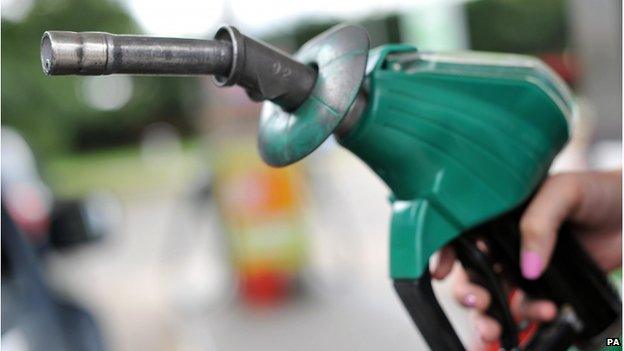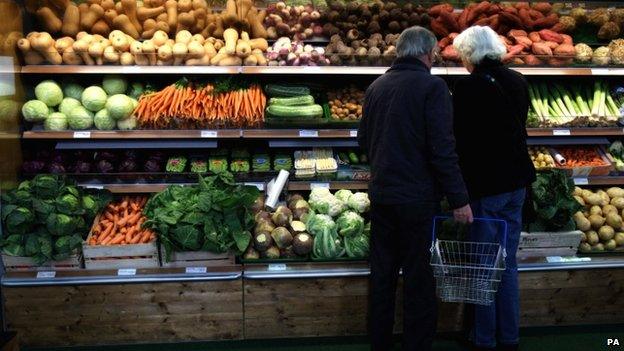UK inflation rate at 12-year low of 1% as fuel costs fall
- Published

Petrol prices fell by 5.9% in November
Lower fuel prices have pushed the UK's rate of inflation down to a 12-year low, official statistics show.
The Consumer Prices Index inflation measure - which assesses the cost of basic household goods - fell to a rate of 1% in November, external from 1.3% in October.
The fall is being dubbed an "early Christmas present" for consumers.
But some investors are concerned that it could slow the UK's economy, as people delay purchases, expecting prices to fall even further.
Inflation as measured by the Retail Prices Index fell to a five-year low of 2%, down from 2.3%.
However, as Duncan Kennedy reports, not everyone in the UK is feeling the difference
Cheaper travel
The Office for National Statistics said falling fuel prices, caused by the decline in global oil prices, have brought the costs of both road and air travel down, with petrol prices down 5.9% in November.
Additionally, food prices fell by 1.7%, helped by supermarket price wars, while recreation and culture prices fell by 0.3%.
Both food and fuel account for a large part of the ONS' inflation calculations.
In the first few months of 2014, UK inflation generally rose, reaching 1.9% in June.
But the recent low rate of inflation means that earnings are finally rising faster than prices, after years of failing to keep up.
The latest report on the rate at which average wages in the UK are growing is due on Wednesday.

Fierce competition between supermarkets has brought down the price of groceries
'Good news'
The Bank of England, which targets an inflation rate of 2%, warned last month that the rate could drop below 1% in the next six months.
The lacklustre outlook means that the Bank is unlikely to raise interest rates from the historic low of 0.5% for some time.
If inflation falls below 1%, the governor, Mark Carney, would have to write a letter of explanation to the chancellor.
However, Ben Brettell, an economist at Hargreaves Lansdown, says the Bank will not be too concerned by the fall in inflation.
"A fall below 1% now looks likely, but the resulting letter of explanation from Mark Carney to the chancellor should be relatively easy to write," he said.
"A reduction in fuel costs is good news for the UK economy, and can be seen as broadly analogous to a tax cut. It should ease the pressure on household budgets and boost consumer spending."
Indeed, the fall in inflation has been called an "early Christmas present" by politicians and financial analysts.
But falling inflation could be of concern to investors, as the UK moves closer to the eurozone's situation of battling to avoid deflation.